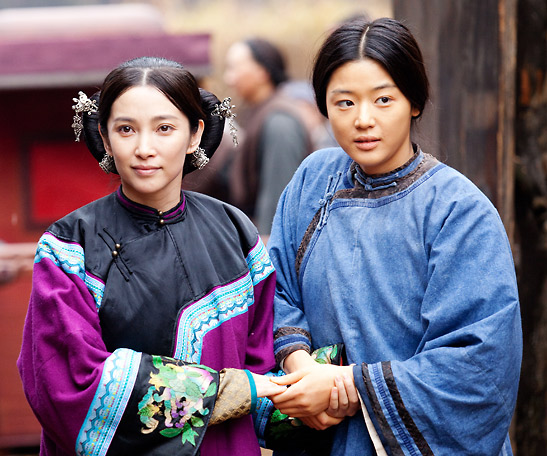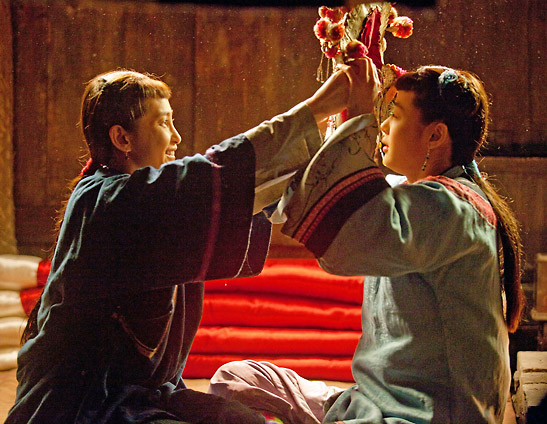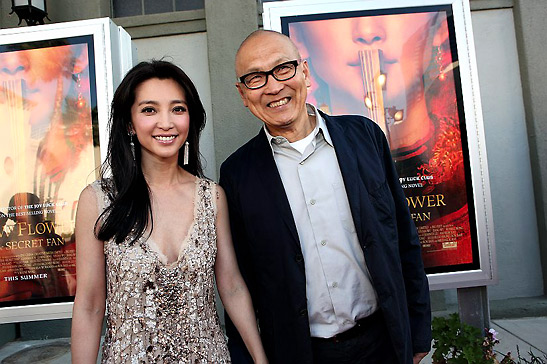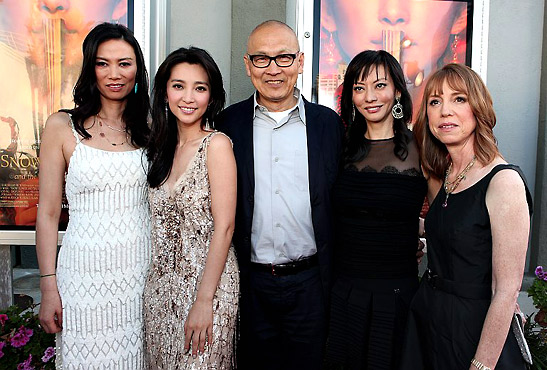 |
 |
|
 |

|
Director Wayne Wang
Interview...
Wang’s first film, financed by a grant from the National Endowment for the Arts and the American Film Institute, was “Chan is Missing,” and was followed by “Dim Sum: A Little Bit of Heart,” both of which established his reputation as a sensitive filmmaker. At a recent press conference, Wang sat down with a group of select journalists to talk about his latest film, “Snow Flower and the Secret Fan.” The following interview has been edited for print purposes.
Was it a challenge to make the film in Chinese and English and how did you bridge the language barrier between the two actresses? Wang: Everyone said that they wanted the film to be partly in English. I said that was a tough because the characters are Chinese. I got the idea of how to accomplish that when I was doing research. By way of background, a lot of Koreans actually live in Shanghai now and people don’t know that when the Japanese occupied Korea, Shanghai was the only city that had a Korean Consul General. Anyway, I liked the idea of casting Korean actress Gianna Jun as Snow Flower/Sophia and Mandarin speaking Li Bing Bing as Lily/Nina in the two key roles and because they spoke different languages, English became their common language. In the scene with Nina and the CEO, everyone spoke English. Is that an accurate portrayal of a typical business meeting? Wang: The CEO was from America and didn’t speak good enough Mandarin, so he spoke English. For social status reasons, a lot of the middle class or upper middle class businessmen in Shanghai all speak English and pride themselves on that. People from all parts of the world - like Australia and America – are doing business there and there are certain communities that only speak English. Let’s not forget that during recent history different countries occupied Shanghai. There’s a German territory, a French territory, and an English territory.
What hooked you in to want to make this film? Wang: When I read the book, what drew me in was this contractual life-long, non-sexual friendship between these two women called Laotong. It also talked about practices in our history like foot binding, and the secret language women developed called Nüshu. Also, it’s a very strong emotional story about close friends who, through a misunderstanding, didn’t see each other for years. All these issues were very fascinating to me. Why did you cast Hugh Jackman in the role of Sophia’s (Gianna Jun) lover? Wang: Because he’s a big star. (laughter) Actually, when I was doing preparation in Shanghai, I went to one area where there are a lot of very nice bars and the owners are all Australian. That’s what gave me the idea that it might be interesting to have an Australian character. I also like the idea that China is doing business with people from outside and that women are falling in love with foreigners. There are many Chinese women who are more interested in Western men than Chinese men because the Chinese men are kind of awful sometimes. (Laughter) I’m just kidding. Do you think people will be surprised at how cosmopolitan Shanghai is? Wang: The first time I went to Shanghai, which was a couple of years before I made the film, I felt that it was more developed than New York. It’s like New York mixed with Las Vegas. It’s more modern than New York, on the surface at least, but deep down inside it’s still kind of old Chinese in many ways. When we were filming there, they just started to build the fast rail that goes from somewhere in Mongolia to Hong Kong. They just completed construction and it only took 18 months. Their infrastructure, and the changes they are going through, is simply amazing. Between directing “The Joy Luck Club” and this film, do you think you really understand women? Wang: (Laughs) My wife jokingly says that I was a woman in my last lifetime. I’ve answered this question so many times so I think I’ll answer in a different way. When my dad was born, he was taken to a fortuneteller who said that he would not have enough wood in his life. Wood is one of the very key elements in Chinese philosophy. So she named him King of the Forest and the characters from the forest are all made of wood. When my older brother was born, he was named Prince of the Forest. When I came along, my dad really loved John Wayne so he wanted my first name to be Wayne, but had to find a Chinese word within the family of wood that sounded like Wayne. He ended up with a word that means a small bud of a tree that in Chinese readings is a feminine name. So when I went to China to do publicity, everyone’s first reaction was that they thought I was a woman director. I had to explain that it’s just my name that is feminine and that I got my name from a macho actor called John Wayne. In the Chinese culture you have both the male and female sides within you (Yin and Yang) and you’re supposed to balance the two. I think maybe very early on, because of being so close to my grandmother and my mother, I was able to tap into the feminine side very easily. Were there any challenges in working with a Chinese crew in China? Wang: Yes. (laughs) Let me say that China has progressed a lot and is much more sophisticated than when we shot “The Joy Luck Club.” Amy Tan, at recent Q&A, reminded me that when we shot that film, angry villagers surrounded us because the person that we paid off ran away and didn’t pay the villagers their share of the payment. That’s how it was in those days. Now it’s more an issue of a lot of manpower on the set that makes it very chaotic. There are a lot of people doing the same job so they’re stepping over each other. For example, if it rained and I would have to walk from the video village to the set to talk to the actors, all of a sudden there would be six umbrellas trying to block me from the rain and I would get completely drenched because the umbrellas would be fighting each other. So what you have to deal with is an over-abundance of labor and lack of organizational skills. At the wrap party I found out that at one point we had 250 drivers. (laughs) Did you want to make a specific point in having the story take place in both the 19th and 21st Centuries? Wang: I felt that it would be interesting to bounce off of each other. Although women are freer, stronger, and more independent today, the issue of a close emotional relationship with another women, without sex, is equally, if not more important. In shooting in China, do you have to censor yourself in any way because of politics? Wang: Yes and no. I think they are much more open, but there are still a lot of sensitivities, especially in dealing with how much to open their markets. For example, the other day on CNN it was announced that China has banned “The Transformers: The Movie.” They did they same thing with “Avatar” and took it out of the theatres. The reason for it is unclear on the surface but you have to read between the lines with the Chinese government. They don’t want a Hollywood film to take over their audiences and they try to control that. For example, they removed “Avatar” because it was doing so well. How are you viewed in China? Wang: They view me as a bastard because I’m neither Chinese nor American. (laughs) I’m proud to have been born in Hong Kong, when it was a British colony, to very traditional Chinese parents. I was educated by Irish Jesuits then came to America and was influenced by Bob Dylan. So that’s how messed up I am. (laughs)
How much direction do you give to your actors? Wang: I don’t give a lot of instructions, but give very specific direction to help them or to get something that I really want. I learned very early on from William Hurt, and some very good actors, that my job is to provide a space where they can be free to work. William Hurt came on the set of “Smoke” and said, “Everybody in my eye line walk away. No pictures can be taken while I’m acting and if you want me to do something, use the other actor to get me to do it. Don’t tell me anything.” If I wanted Bill to get angry, I had to get Harvey Keitel to do something to provoke that emotion. I also try to free up the actors so that they’re not worried about having to hit a particular word. I give them the freedom to be the character and generally provide a place to get authentic work done. How did you avoid getting labeled as just making films for and about women? Wang: I do a lot of different things because I’m a lot of different things and because of that, I have always tried to run away from labels. After “The Joy Luck Club,” I was labeled a Chinese women filmmaker or an Asian filmmaker. That’s why I made “Smoke” which is all guys and set in Brooklyn. Then I sort of became the ethnic diva director with “Maid in Manhattan” with Jennifer Lopez. After that, I did “Because of Winn Dixie” - a movie with a dog, so it became hard to label me.
When you adapt a book to a screenplay, are you nervous when the author sees the finished product? Wang: I’m glad I’m not around when they see it as that would be very stressful. (laughs) But I try to be as authentic in adapting and capturing the essence of the book. I’m always super faithful to that, even though I know I can’t use everything in the book. One of the things that Frances Ford Coppola said to me is, “Never adapt a book it’s too complicated; adapt a short story. It’s perfect for the film form. Especially with this movie, I understand his sentiments, because I added a contemporary story and it became very complicated. The editing process was difficult, as we had to take it down to a place where an audience could accept it. Do you have a future project in mind? Wang: My first film was called “Chan is Missing”
which was an in-joke on Charlie Chan. A new book has come out recently
and it’s about the real Charlie Chan named Chang Apana who was
a Honolulu detective in the 30’s and I’m interested in adapting
that book into a movie. |
This site is designed and maintained by WYNK Marketing. Send all technical issues to: support@wynkmarketing.com

|






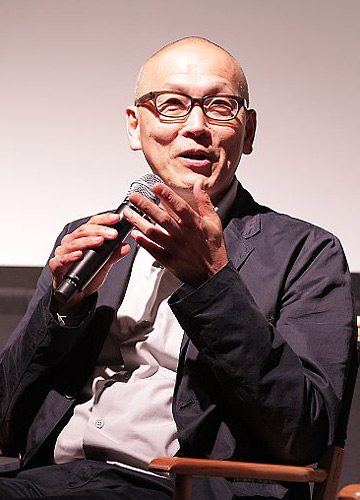
 ayne Wang arrived in the San Francisco Bay Area from Hong Kong, where
he was born and raised, in the late 60s when the racial description
of “Oriental” was replaced with a new term – “Asian
American.” Finding lodgings on a Quaker ranch, where in did chores
in exchange for rent, he enrolled in the California College of Arts
and Crafts in Oakland where he studied filmmaking through the eyes of
directors from the French New Wave, German New Cinema, as well as Kenji
Mizoguchi, Yasuijiro Ozu, and Satyajit Ray.
ayne Wang arrived in the San Francisco Bay Area from Hong Kong, where
he was born and raised, in the late 60s when the racial description
of “Oriental” was replaced with a new term – “Asian
American.” Finding lodgings on a Quaker ranch, where in did chores
in exchange for rent, he enrolled in the California College of Arts
and Crafts in Oakland where he studied filmmaking through the eyes of
directors from the French New Wave, German New Cinema, as well as Kenji
Mizoguchi, Yasuijiro Ozu, and Satyajit Ray.